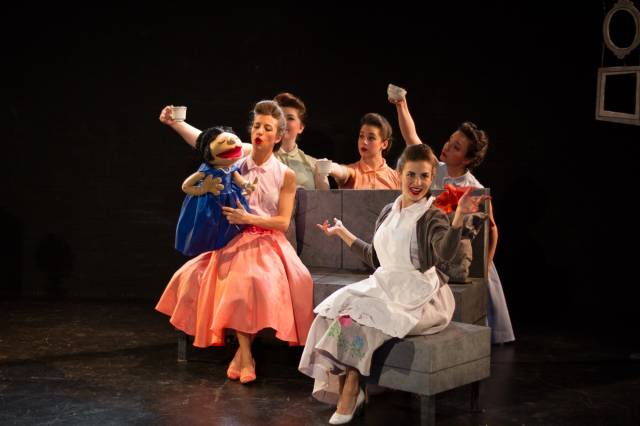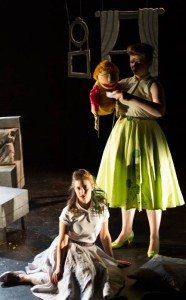

Coffee and Biscuit is an adaptation of Henrik Ibsen’s A Doll’s House set in 1950’s suburban America with puppets. At first, the idea seems outlandish and twee. A classic play that revolutionized the theatre and was a major step forward for feminism done with puppets!? But then one realizes that the art of puppetry is essentially the art of manipulation. The central character of the play, Nora, is manipulated by the men around her in order to gain what they want: Sexual fulfillment, financial and job security, but most of all, a good wife. Playwright/director Teresa Bayer has taken this theme and run with it, resulting in a brief (the running time is only one hour) but transfixing, multi-layered, and fiercely theatrical piece of theatre.
A quick summary for those who aren’t familiar with A Doll’s House: Nora is a housewife who is secretly paying off a loan she took out to pay for a recuperation trip to a spa (Florida in this version) when her husband Torvald (Harold here) was ill. Krogstad (Carl here), the man she took out a loan from, is on the verge of being fired from his bank job by Torvald. To protect himself and his job security, he blackmails Nora by pointing out a fraudulent signature she made on the loan. Distraught, Nora must figure out how to save her husband from a social downfall that will befall them should her actions be revealed. The ending, which I won’t spoil for those who don’t know the story, was known as “the door slam heard round the world”.
Coffee and Biscuit is performed by women in pastel 50’s housewife garb, with the exception of a grey-clad gentleman simple named “Man” (intensely portrayed by Mike Racioppa). This man is essentially the Puppet Master for the women. He makes a tea-sipping gesture, they sip tea. He makes a vacuuming gesture, they vacuum. He is aided by voice-overs (provided by Olivia Brann) that instruct women how to be perfect wives. She informs her fellow women that “A women never complains that her husband is late”, instructs to “Always have a cocktail waiting” and asks “What can you do for your husband?” This not only adds a palpable layer to Nora’s fight to claim her independence in a male-dominated world, but also brings the media and its portrayal of women into the conversation.

Nora, excellently portrayed by Zoe Farmingdale, squeaks and chirps like the little sparrow and squirrel her husband deems her. With a broad and appealing smile, twinkling eyes, and mannered posture, she embodies the exaggerated expectations of the American housewife beautifully. The actress has also created a lovely arc, gradually grounding her performance to reality as Nora realizes the hypocrisy and selfishness of the society she lives in.
The rest of the cast portrays the other characters through puppetry. Each displays skillful puppeteering skills and strong characterizations. Melissa Diane Martin in particular brings a casual pompousness to Harold, Nora’s husband, who constantly asks Nora to bring him his “coffee and biscuit”. The inclusion of puppets also adds an extra layer of irony in which Nora’s manipulators are being manipulated themselves.
Ibsen purists might not appreciate some of the departures the play takes from the original, and there were some moments that could easily have been made stronger. Additionally, while the abstract design is excellent, there were a few odd lighting choices that didn’t show some moments in their best light (no pun intended). However, the theme of women being manipulated by men is powerfully portrayed in a manner that is neither pretentious nor inaccessible. While bringing the setting of A Doll’s House into the 20th century, Ms. Bayer has also managed to bring it into the 21st, chillingly implying that the media hasn’t stopped asking for women to be nothing less than idea.